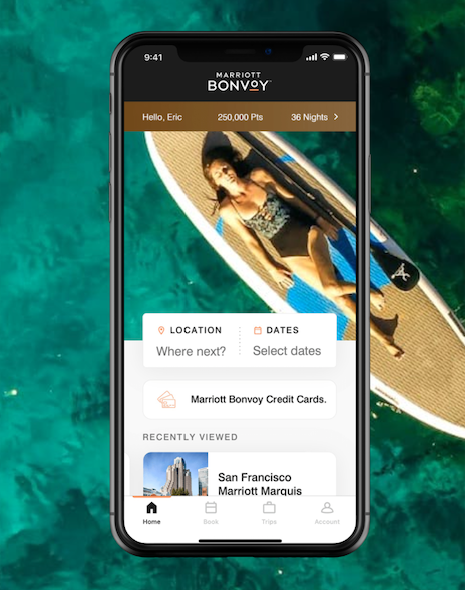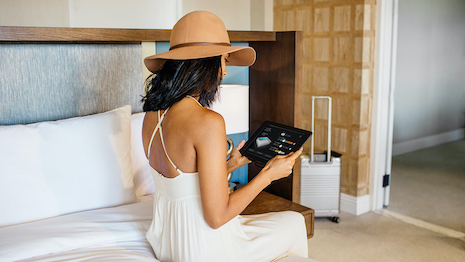Digitalization has rapidly become a top solution for reshaping the hospitality industry as it looks to recover from the COVID-19 pandemic.
Technological innovation is crucial to driving revenue, enhancing the guest experience and, ultimately, fueling COVID-19 recovery. However, during a virtual webinar on Feb. 3 hosted by the International Hotel Luxury Association, executives admitted that the hospitality industry is falling behind in digital integration.
“Technology will play an important role in helping our industry recover across an array of business processes, from how we price and sell to how we deliver customer services,” said Tim Harvey, CEO of Core Ideas and former executive vice president of Hilton.
“Recovery will not be linear, so technology will also help companies achieve agility in their responses to changing market conditions and, ultimately, improve operating margins.”
Invest, integrate
While demands vary on a case-by-case basis and discovering the right solutions specific to a brand is important, there are some general areas that will drive recovery.
With labor shortages, technology could become immensely helpful in controlling back-of-house operations and making a limited workforce more productive.
“Labor productivity enhancements is one area where we will see services become more demand-related, where there will be more direct interaction between services people and guests,” Mr. Harvey said. “Through technology, when guests make requests, hotels can better schedule and manage labor.”
There are major opportunities for technological innovation and investment when it comes to guest services. Brands should be figuring out ways to make all touchpoints easier for guests to enhance their experiences.
 Marriott’s Marriott Bonvoy App includes a mobile key, remote concierge services and more. Image credit: Marriott Bonvoy
Marriott’s Marriott Bonvoy App includes a mobile key, remote concierge services and more. Image credit: Marriott Bonvoy
While check-in and concierge services were quickly digitalized due to safety restrictions, guests are now expecting similar capabilities from the comfort of their rooms.
“We have been pushing the contactless and remote-use technology into guest rooms to match what guests have been used to doing in their own homes,” said Nelson Garrido, senior vice president of IT at Brookfield Property Group. “Most of our brand partners all have their own apps and are absolutely leveraging those.”
For instance, to better understand what drives guest satisfaction, Four Seasons plans to optimize data and technology to enable a more personalized guest experience.
With usage growing by nearly 300 percent since 2019, the Four Seasons app enables guests and residents to control their experience and engage with real employees on the property. New app and chat features, such as mobile key, mobile payments and updates to the restaurant and bar digital experience, will be unveiled in the near future (see story).
With in-room technology, it is all about instant gratification — guests are not interested in being on hold or waiting in line. Further, hotels can make suggestions to make the experience easier.
“With a guestroom tablet, they can put a food order in right then and there,” Mr. Garrido said. “We even saw an uptick on the average check that from a room service perspective at a particular hotel.
“You can do suggestive selling right there on the tablet while they are ordering, again, making it easy for the guests.”
The panelists agreed that these are not new technologies or new ideas, but that hotels are simply not investing and integrating at a fast enough rate to keep up with growing demand, and, eventually, they will be forced to adapt.
Personalizing hospitality
While technology can make things logistically easier for both guests and brands, it also provides hotels opportunities to personalize the guest experience, which in turn, could optimize revenue.
“There are many creative ways where we can utilize technology to, not just upsell, but really hone in on what our guests like,” said Judy Chen, vice president of development at Dream Hotel Group.
 Bryte’s AI-powered Restorative Bed aims to provide hotel guests optimum comfort during their stay. Image credit: Bryte
Bryte’s AI-powered Restorative Bed aims to provide hotel guests optimum comfort during their stay. Image credit: Bryte
Sleep technology company Bryte partnered with various luxury hotels and resorts to bring consumers a new and restorative sleeping experience that could help improve stay experience and consumers’ willingness to return to certain hotels. Its Restorative Bed utilizes real-time technology that intuitively adjusts to an individual’s specific sleep needs and preferences (see story).
Hotels should be looking to advance all touchpoints of the guest experience, from physical comfort and food preferences to activities. By removing the burden of certain processes, guests focus on enjoying other elements of their stays.
Research from Ritz-Carlton found that luxury hospitality guests are looking forward to tech-enabled travel experiences, with intelligent services enhancing the overall quality of a trip. Properties must strike a balance between the practical, convenient factors of high tech and the human, communicative element of high touch (see story).
“If utilized properly, there are many great advantages to technology that can help remove the things that people do not necessarily care about day-to-day,” Ms. Chen said.
“Are robots going to replace everything in the future — no,” she said. “The human touchpoint and interaction will remain the same, but we need to look at how to balance the happiness of our guests, staff shortages and maintaining brand integrity.”
{"ct":"zwv3jNMBC3b9gv+mnXWc\/eCZQN4\/Rqk9r4xvxP1\/e7axOs1Ei0VbLULIpd54uUOYV3MsLtsDWuKoAIg5CVZzG0Thkr\/1r7NYRlF9jO2fWHmwrQm7hIlG1KuxVgQZ4Pvkj\/bAbdtse6GpSY6NPGw7ETFL1GdNJVA1xBkUg2yhRlugg0+19fJAumMFGhqZRXD+MN1b++cl6SkZc+lwVmNj1OLT3\/oXyy+7cEJlWcJlsrFMAlF6Jv6ihwCqpa+fP0W3DkifHp+VqHC1V2+609TJZzFXLCeVA99+OKXvMqm1pgDkU1Gch8b19IEftmRb81HTVO16CtzY33hsZYDFhip\/G6cqTLaf85DkRcy6FdF1eIneMgxFKhCY0l0cXvykwrboeTQFxUlH+S22p5oESz7RR0YaYft7rfYByk2jO+RncNdPjjdQLhYSg6cfhQBQ3CYgIB6zmyxgxnQObgEyDWx+6ffXw2IuJ3Wc7B9WNyIA2PjRxzK3duwlC9y4V34jMQ7b7VUZS0+ufvn\/DErC93hoz08OHDs+J53DR39azFR7P4obSqhXl8lHOxob34T56IK2vjHdyn8F0SRyKwN37cZKRb8z8Wl+ofJ4WrK+2uaC5\/RiOUAJEhpaGdR9JpSmei3kcajoj038oakodaq\/Ddv\/DkuM797fUH9rhD02KMKKj1ul4iXa1m+Ajr\/h1JuawXyt4QffRDk63fAKni0BlsNK8H12WOwaB+39tKEpUydpha+OQQSZBhWB9xUM1BzU7f\/On6HMPMyJqmMZl+MqCqeozPn7muu+oomRuM2a8D8semhN\/rfe4KzxE6URGO1gXjwWgAbQ9s+X2vF0il9CjPXhavRXBjcXthWZztxgi6o4XK4C+S2XgDrAbZwR+k9oANcHtdGx11PpYLqxzT77PQouRChoj56x8Z2yghxSzlguJtZNL\/gpd+Drk3WWXFleCJof9B1ZULOGPP2kZVFDMVIujsl\/ciR9KvIRrWFb5sYatcLl16E8XwSk1TrCksDDcDpMctw53BFIe2O1PzMFqSEt33y0POapMsPvN\/Rz5ulrkp1cQ98h5eJHwdZN4UlUj2CiJDzKuZUoiq0JMt3JjZSKTbds8qC2Y1LcKq7+oUD4E8UT8da0iFHQYndmKxOD9fo9sc9ABEgE69FZscvA1xdkAECpb2nH+ZcrG41XbxBr0y3rjwOeSXZnWW69q0KzeurgKYvxgqEfxy408i2vMG6t+UmBjV6Yb8o62BQNhYEVqRRflUA1bU7gzvJGSoRWN\/7YJL83GQZfBrHUWLdCQwN37VN6nCL4JDEYiS+naQoIK6\/LDY9tnIfl7GvVSXcnp+o20p5iKKMq3UnVde3WACAr\/hv9JCY9pFInn4VVDst2avTYF4+GOl4fnkn6FGPZCu6jwLVMulKrtqgt671Y6dIvHh7wIZhXmPJoOXd5KrtvZ7D\/9QkUngZ6FlQmZKMyNaY7jAp4UmOU89Bsf2VTi9XpocCdtUPPcFgv9FOJCw5BvN7MyvaGRRq15unf3oEJq9CBWlHASZDEhfcU29MW8UvNEmZIJ755ldp8wNQ4p4mfdsoEuHvdvqLNmGsQGlx1MNSU2u3d6sjXAfvA8a8RhiTZJClrPf6BLcj09r+gPa4Yqi6JF4QtbloWvcfRnjoCH26+T157a5JSQwRqDarLAlZYz9pgpK5S9b9+QpagRjuPhFVKYJbBq1qHuzULR2T4WVePiR1V+857LgD0HzirT9MD\/GxkcajdZfglgBvPjPBWpu5lzJwTWFCuH5SwgQjLX6ylr27RxWkGcsaS3Na1HRwMQllfE1l4lXdptChsg\/Li\/8a4ET2hVu8VBkzIcNYKEwjXlc\/s\/hn01hW40GmDAbTYLHJQvD9s5wUIkkRnqYIn6Nhon\/NrEBwp49VSslFvWLlb81\/MEBk4IDQ1q8Wn1Pr9bEG0rZsw8+SR3uEOcVhyHmc6hgz6of+egR8maaPYuAJzg5laXWsSaF0c1Et6OZqFKYGZyl+tw\/xbJkazPbPPi2hdQhytv9Yu1dcMVw08w4sDqZ0V0rSIRwPGbMnIX4KRLAjqm\/2zV5rDT7HK0QohgeQLyJYxv8RAUsDDEJK4awUTNg21guZZVNwNxWPGTwXkXvO\/bLERPJEHF3BUYuRIRy+DTvftz6PV2Ndz3ARvX6Yc3ELasjJWuYTg6x4X99gmEpXOfH1XGPdEFE7kaMTcEzmR+3GtEEim1UqDfGzfwhpOWo46SDt+DfEYjtp5vmO38+QWX2qFSEQS1i6yzURxKr6zUjuPAXd4zldFphAiWUiLtgPtyo3SeZaEQx8EWSLfmw3nj+7xcHHkDb\/z7wJnezP0d9LixAb6NHxvSIEwiHir2fizO0HTMcKBVoOMwQXnBVqxHqcOKFScomQqtT4hp4psaJliFFFdptDLats7Di\/7dOIIWr+hnqQiNW+EPIidecswOsN7pGroRTLZj9g10Y29MONo7\/LFYMYE9TipD2sRjM460OkMWQKIwfapPApyUYFntg6YIbX7t26k7MxQKDYT3kT5OpKcMx83PhP0bVcaC7AEfgWmGqoZb1Pb3X8plBmqRazGlIsyM2LdO7Ung8eXKIDq36JkH54FbtVlPsqgv9JfH4tH8d6K8RefEtC8BSvbkHLcZfx2v5Gmw+ITSAWfGksNQbQiQ4z38gDCcogqB2bA9RrCJkhILF\/nFsKMstzwZ2hdL3oQZfxnjtfV0wk5c3aQK2ezqEtz0fLa7IJJ5ukpLZnJNtTtv2S5vvHkA0pQMVTp9LC3djp5Ch9Dx2ItzICS10rPY5NWcT2+gKbKQqlFVIr4QEu0Lr70mL7VRGPMSuYKYO6rlNiK0Gt5bFzMLksSqnmAxTgC9WHRMzwkHimq5SwPoRg6eyPc+OsFJe\/4wO79gVOU54oy8QO64Eqw+lz+i0IbU0yzEqVnZx2mAthYvO8MC9TA\/Hk2uu7ADksxKkb8DZzWrQgFEsFZQDeKRsHD3+BcwclpvDZd\/uMJyt8S+ywmVbQWhVcN87m\/PR4FwqvHOFKnG4elSGBYTiVbx5wH3tT4xFSCYTEeBaUNsPDXbfagYGb7aEPzZ747WZLbLEuJAQfK1VM+AltxJ5pmlHlzxVSLNtSlaffPQ1tQGb5DIjjGL6dgG2JtB55yYJxRnrJ5naHl7y7dknmv3fQSlgG\/e6jz59RLnj2dyTjjjPA80Y3tIhtvDlB+jyh2FPRfrXqQLQlExyUbkj+nn9Vfr1T1ayHUpjz9hSAROGeInd72oHzxRBXlkH\/ypee+G9AgTz1Y7svHnGXxGlkbJ823oDRyU8Az7IM2F5V0BBHxZZE8DnCqjjVXdtNZMiUUay9N03zJG7LBjyPu8xdBdvV9DRQ7Frurlz2brCWJwIQPghVuCP4kw7c7IbiD9MMzVR3MeJfE\/lj\/GDFkq0xV1iFs+K+sgr1wK1iIyi39tPNL5rWD\/igPWALSNBj3FSE9j3xCSVF03BirZy79B1apzVBlzLfj4Z2kLZcuTqMInARuJBvi9oTbo2EoVwY\/FYR2+yDrEsg17dQFI18hjh17WVVJTbeFh8IE7+Du6AJ+9T1U6OgHw8C2iRgZ95mHjYnSrs7J1qqCwR15ZnPYsFEuHlXib9frp6D4pZ9dk+E0jIH7uHhM4E\/MXhBKT\/1fyB22MkPP3qr2FmCjjlEOmCTIsUQTh3d+aWDXepa6ev3+yDdZtG7Eu2pje1knLgWWvYR\/CVNNF16Vrfxs0CndS+wq3CF728AzBerJIY5h6gpksrjh6CYnPHpm5k6\/6258jRaXbVKeN+fOXANFgMvtQ7N+vo1G5NV+5jLp0tkONPOizAfXMdTwQ78KqabOSsrlyK7jit0Zu+cKzNMZnPoTA7iiGuu5rGFsbsZkDRjlDsJZsmOAlUzs4ct6TmFgVTvz7KBUOC+f\/pR1gQv2CyIMf41sVwNKwtYnatFGyc9NPwfR8Wb+GI823T8faPIAXGzpEeCLHnM6iKnYRNbmkZdVeFiOaylHTqj6tdffc2eN8fXBwxjVltGZkoeH+AwYdaAz+lD5EbV6\/iFWULXq8B\/vJHjXs7Zz4gU7TM9RPGF3rji2Qd5o6zYKE149VQLxkM94TSSgThbRcscLhT5mOQiS2AViB3wtftrvfcfqXV2cOeQFvcTCOM0y91t0C5jUd+hv6a47XYWpLhpyganCkadDdRyK59gAv6Du3Mril\/nkSUd+tFLHkxkmCGKEuY5rXSuvfZ7b3jrTTQJFbkQu6j7mybpe5VHTZQGgcYRQEz20VnIrDsRHkNovycjYQyFVDBMRnZpx5y8ID8XgFj5mD3ktY4ixN+Y49iP9djJyj6i2qHBElJ8zU2IXigirbmWK3jP4xz+8xgnlNfyaMaZ5kUekGkiRMbcFDkxHxlGhbCH0rxC0Bk6IXujoo7iFm7HbLgCXmStMJqOXAastfm9gE4BWIlOXidbk13WkscCq6ulIPxrqf+UOdtQcX4PkcmX8JpFUomORgdeodRO8rX5JUym+BFWFyFnlDMpyiwxy4R\/wOG03QLjHSZ98N\/G0c8Mq4f+p\/W68FtmpQhJqA1iZat91HJ7UNEsIkkFT2kbVQ2e6uhlpDWsqYeTmaj+kHwSqnSR5PNZhd1Hih\/WKnIo4VtAGDZPjZYqzpUr3aySNF3aMoWGiChrthXwceVh996KvlzIHWQ7R0xsIvlEV7USRiRfG6NUYLA5XM4AtZRGiSvVuLB6VzSJ7dR45C6qVXrDq39INpHriTwRe0uQuH5lSmxJWIwvyFRNHTikVH0PleSPnaMYDK9I5pcKWTmW4pmXj3vgVOe\/RnnHoC7Z1lFZldZKgcFx8YQT0nn6QCjlAilIG3+eTSRFeK+JaP2WdkswL\/kOjDzKJHd1+rrISwmzUBN09l1zCYpUmNxCpns5E6QCetDoP2++ygupibFOdYPn8dzx8w7NJNwQSib6oe+uTTD329cbS1WcwY2L8Wse9jFuRWp1pNs8nitc+0L2MUE9YmvDxSBb+EgaUv1bi+WpZzXg+gKrPl+b2dgYi5uJGNTiX+ZHoXVaibI91wPvZ0Fvz7Qye35ndrXpOXA\/rHG2MdBTA\/APw7g\/iDBJG\/BT7B8bYWZy4Ymzl3CGasYtfKklP2hJKSdGAtlYoG\/JX3njbJDOsQy771GgOxe+BDdQJURJIhJwCqY72XNiqpnX2TmietNYHH\/22fx\/76Lb\/OlmDMIWRqzvtR9FCQP3kg169NpK9bv\/IbojP\/mWv\/grG2HsAB8npqhcgniD77m9d7rI17beTiQlAagfiPcRbCh05YBBrYMrmhb7LII0twzgKDC92lj17nyQoQiTv6O4AsSSA4Okmr3BOWsVIM2HJV7pO49pIvDCySIAX6s7fTeM8FwdB1gGEUkbxQ25POgFJh1GE2foQpxkuRSxAbNBJqDgogRIkiaJQOVJcpNY5IaKCM\/M60gJ8WSCZQ4z9E6NZrub1EFlx6CtoDwfvjE9Vn1ANZ6lqeD7UPF4pgI29ZCiIsdIBseY+CV97rKvuMlkI+Yx9XI5YZCNuPEUCItUbRIWzyS6wtRSoTAqluN9YhwxDwB6fzwvtWPJRlYFJ0jWyCRW51GwDdsBf6roPFFBvHw5907gvNIijyMiC6P8zcX3fJxVeswWcClp2n5Yp1Bm8\/wMpFdEOZ\/hNH8eqFzqarfbdnNkjGuR9LVrZnd3N4Crk1+kwBABaaM2pGgcOo0oetvwI99qMtbvY+sVui2nReVbZ9q8BcAb\/IBZEHR7QGst6RfvSQwabZ8Jf9rvdTDMx8JcHfCclpjnSo6MjX477ERBUByzDY+I7ZKTXpuNok\/urinpCUqxhdmcwCpCilpGswPbbZRYSpyN2P4oru7R92AnAqozOm6Jzs1A5tz5w66c88iylLnngLCSZlEIGHOQpBLO0CnfP2sOuThgFD0JtJk8ojyd1n3azRnW1kgVNJAGapIT3yyFbGe9IirkWUhiXDsVXHUic4iDOda1EGASTK6klgR4bkhW9xYRrpRO83emF\/pKlq6OKh2SSgTCbH8\/O7ywTGUYTItQe++TWMoQZZjHa7U2M64Smp7j6gn3Fl6CwRxp5tdGGrf8zs\/CX\/OwWtXvlCT9nJVZju0WFpF5ebM4ZmtjM3DeSzKRZu1Cqx4SmLZkOowrp4+DsdOQMvph8LPfgiFWWREWH\/fOQozKUfW\/KFVv23lFrmk5MoRD2g0cHHNwgaSIav71+MdEFkrYUx98dnUQlqsKzODppxHXYuVQLAs7EAVwPh4z\/CWZE3ekvqA2xOw1u40jfby+lzyWSMMytWlYWQ4WsGfjE0UojtpEsZ9jViDONeVM6nvSbeokEDiP+GKdXawxXvv8IAJKKOyyjmX+DB2vt5nVDFbw6zWCSTPFMexg9pyxoRVlgHgv+xzxIIsD8ZcVhex4O6Sz+LcALrLqXox\/liBvJJovJD9FQ\/tBe1ExZ3QzKAa7bfV42rX+XrP+\/pqy69IwOHkVGmBNjFjJGgUxggX0iXPfhxc79FyeRLo5E8PholKSRsWIcMtytziut3yMKa0FSTQ8Z4DskK7Hud30xybpIZstOo2RC5K\/iy3Nv5enH45UqrOlYRy52SKlFPvc\/OUghjKcTbVsCL1uEZCMKYqi4iNSv4rY3l3NlNkiHTrunHkoGCsT8lcQtFtNZdmNpgsJtGFIFoLzloJPIsSQgkUQN8PNaK6xolKfZGBswxp5AC6tsHuCjIcTwFyg\/OtZIo\/PSLZGfFul5sFSpwgla2PH8FQIg6V4F6s95OkQZ8cb9+rP82csTX7P5Yab6ClSDHBAe6cwTvFn5A\/6DL4SJJo+DlCtfxpzPCP0Yl8MLyuATF7R4jVIFcULYM9w85RzOoL59SVUvbH8YcGWA1+j4q\/LN0riLNSwcepTKRJJoRLLYUbXa4WlCWsxpnWOj\/kR0KjJXinYNs7ORA\/FnwI5nJKekojR6NB9QqXLEdKE86t6RwYxfbNke0UnMtfCyietUm4EiMaitiMwMaQxdb895MTOwQo3SbR9XUih7P1b2byTswa8tCCQGk5C6Dp0xvycDwMf+JNcDdaSlP9QiQGXK2ttmgFm4HYZv47Jg5oJ49ZbchPuLbkLilXs3OAHRRyFF3aroylj4tpZWNI8e2Thagu097zDpakg3QSfBNl7cz2z\/uu9m2wcpquB4AxY7AyUsqZLVO2gNWvJuLdg3egndMy1HcBpq7cZCBouKEafkZ6NHVt1gtGb5TfSeBluBpwVZNE5qyz5o5G055RRxuQpESjv5wRUME5Mfxr6dtYkCbAjSx6tJdLMuL3no970pe09ySP+nz\/Lf4aHaTocCx351EHA0TMlFxrElS\/LnlCw2arQ5CzPtB6pq6VqjNUONTTmR7noAQVrywm36G4wdWR+T7KAQqnYolZJzS5bN4PbEAHbAg9f5H5UZZsRhnw0MbYHieqi495DpB0JARR7YBDN+T04FhA6thfufAc\/HvM3twe5V9X4GYSC4YF7kTAK\/7CnkYcpm3eGHtKzDpHcXU4ucw7BO\/98TwjbNaX+xkGwsZh4XJ2livm0h2Of4Z30CRYpYhMF2YQQcfJzt2zPnSt8VjKG835w2tD9qCvi+So3Cm\/ib7wK\/gjm34EgewHv9EW2SqB+O2xUytlEy3SdQa+ZjERhMobslmxhf2iGoGahfxkVbLkOV5lll3imaQhOQF\/QNGxZwld6jEzm8Qg1xbPOpSRNqKCyLxZeMKdq3IOXKOLZY1H42BuVrgk+wh5FY3eAL+AoMfejibvZ1QDB3M\/MO4ngajH0K4Hd8QiAW+HaHzH+u85vEI82nrLdhW7Z37tIzZtcGFZyPkdoLQV152eIlOAeLgPYO1b0g0C\/LmkiB7YNoax2FMN+Mjpq8YB+Ri\/3Oppyn0+JQri8GDCdD6fNNvdytyOzE7I5ffidT2opqJ7lCeJd45Etw6L0XLFQKNQxYwxyLG11KhjljmajWNvlNAJ8IiaxvT7BWc7qROJJmYj0Ip277XF0yW4MAWpK4jyABzeDCmnLTLCmTkV+7f1FjhPC7j4ZVoLy2tYNoK8dJSvLGo+6wOwlKWvEnNeFOMl8O5Clf6xjWafw+dfAV6n0B66qoJXKrt0rf540B61xZ8lRnS6yodngKl5oSNUPCniQoM90t\/H\/fZhusc5pFwCA1sVjEvxbFz6CgBt1RCeuubQYq3CmRv2gWiwDUqAUnf7rOa+zzAF8cbykxwS83O+7kRuFSnCAEA\/NKqTQGviPj1NqzvCUdxKv7MESWFbBPMXduk9juF+YfeAoA57iVXt6tN08rPexeQ1we5AVJyv+gSDO\/YtN5vRIxGbxBnRTwu7PgXuSIMF36ja4YzfgCR+PCo3\/DmmemSQ6TciHMFlkfNMs3WM4hRBecqxM7bRwY0vlCmO4xyulI16Fc0iijYrA1BDkpbsZsbdwsZlq4CUTjAPkZl3bRpy77Rf5Pa7tt1CczGLIZ6yuNiEu+WVTSNAjR9\/z8xy0Df0neFocv\/DyxkC8YyT15Jkmaa11iWBE0dHhGrbMZ8DwlEcAPQnSx8YQ375wCVGj1SSaVftr0wpaMKz9kzmi5kCQLPhPl8l9994wTXn9Zc9KvM\/sKM3VqENldXmSBodTf+OjqtCZq2cEZakyJyP5aHbvpkZ++CJ4fbfgm4j+rdVRvqPaFRSv4MgwSpiL4pGhKCbDAwQG9YUbFoFgHbvcqZR4qGmTWVG1\/RybI1i0w91jqkF6nyddZDttUX4A1lAfX43B\/jCddNXCBb6TFtDuW6eF3EdOyFE+YqjldEHAB+nnjm\/y\/Xv9S691NkNnlAEmLZdxOLcCNbdYF19I33MGlnAiC5KWWlTCptiUpXTTaweKEth989PblfqspmnXAs5LfhHsfoMtf9pf+fMT5Q4VtMmg5cKFt6hVQBOnUCJepVJGZXmLaYMWHX7BYclMFeG9EQhCMcRNyLSiGKbDhWQTXRhntVmnpWDRQXnW\/j\/UZctPVsCMNjIqmixotdwC0A5gj+n5kdzbPgXwJx1ej6TI+PCbHH9f65kdHOaW8bbWC97hLZM8IO9uNXtLq8\/aJG4Zo\/UhZcjKHYcxbvFwpIvCq48J2r5uO3EP9MY1NEuHYcTmxGisTC+RhiWNNgjLWA8gqXCz4n+\/tZHpmZ89cNg6kVao8buqHQ1isRNkIyFLu58LpZyYP4UNeNghOUxE+lGmyq56QO+wxoFetfelffu51df7LLDSXMJSRDYZ1SyHWyFtz2B82qU4J9hajmPw8XV7YYILccwHLnZdzAbttgdmLJ0rR3jX5uxBj6UsAnhBzgQD5cd0PORFk8d\/9sLgFqZcpz1tJkA9oTuI44RKzt2hfKna3R9cNBnuhwj6vT\/wIdHfJXSY0qGEAMqQnbvkHKrY1FERqVp0D9mjITnseUj9PQCYDHN9kUN4Sej3oHeZNDAcUycC3X7BocdV+O68JiW\/rp4OSfrKPQdYmMYXnQhVpg+IzgIgEsvw3\/sKJ4bogKR2UTVj8yca+D+TNXK+\/e\/qw1l570Skadelv2sDiCMrkIWZymDmOb3WVBm3G6eyCAKtcCVlPrqJEzqne1WKaQMisz97WCwi+IH57xw08jN0mosuqbr\/4wUqNgozfJHCXIlFDA4SD8RpFUwQhNh1+PJFvabzNlqdjHP20EmPP+OvRBE04wrHCSHuqtlGbCy5LQL9HYbpPObvkp2YQ1IRhpUBP+bWDQzAgWwx04n3PZeYcDvV94+e61AY+qEgP4ad1zYZd0m3zsPvCwj2ERWO8BtKVhAZMPvymsfSzNYedd1cGicH1ghtPGeAl72zwHzUyTp9LcJjt3Tp8F8AsV893tB8XoMeFUSjL4CP+9P5CFcbAPTieoQfPgPA3kMInLduULkB37qmlyaNGLfjyv97WFRTKSBMFWWdj4CDIHLC7sabb+HD5UNMJa2jWQ8y3GrNcgItXZzXVJkKsZzxEt71o\/cBx\/kh8RXP2umg7y6K3w6f4gte99c7GdkDNrecPLQ==","iv":"b77a4fb5fdef51b9610e71d96f4b9826","s":"098d4a4f95fca161"}

 Hotel brands have been integrating digital features into their guest experiences, but there is more to be done. Image credit: Four Seasons
Hotel brands have been integrating digital features into their guest experiences, but there is more to be done. Image credit: Four Seasons  Marriott’s Marriott Bonvoy App includes a mobile key, remote concierge services and more. Image credit: Marriott Bonvoy
Marriott’s Marriott Bonvoy App includes a mobile key, remote concierge services and more. Image credit: Marriott Bonvoy Bryte’s AI-powered Restorative Bed aims to provide hotel guests optimum comfort during their stay. Image credit: Bryte
Bryte’s AI-powered Restorative Bed aims to provide hotel guests optimum comfort during their stay. Image credit: Bryte